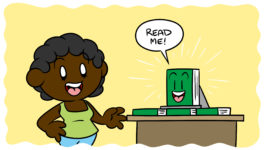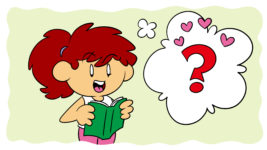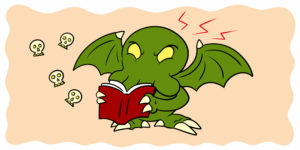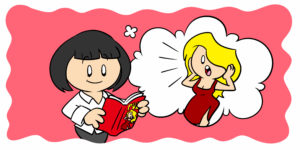Erotica, writing intended to elicit sexual or romantic desire, inhabits a fascinating place in the literary world. From Lady Chatterley’s Lover and Delta of Venus to Fifty Shades of Grey, erotica has an inarguable place in even the most academic appreciation of the written word, and yet it’s simultaneously one of the most denigrated genres in which an author can work.
What can’t be denied is that there is a vast readership for erotica, and a veritable army of writers working to provide it. You only have to look back a couple of years to see E.L. James’ sadomasochistic erotica exploding into the public consciousness, a process which saw both a best-selling retelling and a big-budget movie released this year.
So what does society want from erotica, and how can authors find readers in a sea of people who claim they’ve never bought or downloaded an erotic novel? In this article I’ll be attempting to answer these questions, providing erotica writers with three ‘rules’ to help them succeed in the genre of their choice.
Before that, though, it’s important to answer one vital question…
When does erotica become pornography?
It’s often difficult to tell erotica and pornography apart. Despite this, many people hold strong opinions on where one ends and the other begins.
The most common ‘line’ between the two is the idea that erotica is more subtle, or more reserved, in its approach to sexuality – erotica is seen to elicit sexual desire, while pornography releases it.
While a person’s definition of pornography is down to them, the above definition doesn’t seem to hold up to scrutiny. Rather, the two words seem to be ways of talking about the same thing while applying an implicit value judgement. ‘Erotica’ is presented as smart, civilized and sexy, where ‘pornography’ is presented as brutish, base and, at times, perverse.
This may be a hangover from other mediums – pornographic films, for example, are much different from erotic films – but in terms of written content the line between the two is so permeable as to be pointless.
Again, erotic writers should feel free to apply whatever delineation they see fit, but they shouldn’t feel constrained by other people’s idea of when their genre becomes something else. For creators of erotica, the terms more usefully translate into ‘writing about sex and romance that I approve of’ and ‘writing about sex and romance that I disapprove of’. The judgement will always be a matter of personal choice, and fifty people will have fifty different opinions.
To try and write erotica which is not pornography is a no-win game – authors will find their time better spent in trying to write erotica which they and their target audience will enjoy. To that end, it’s a good idea to remember that…
Rule #1 – Reality is overrated
Fifty Shades of Grey angered some readers through its promotion of what many found to be an unhealthy and unrealistic depiction of sadomasochistic relationships. The male protagonist, Christian Grey, is sincerely controlling of the virginal Anastasia Steele in a way which seems to denote a genuine power imbalance, rather than the equal relationship with agreed sexual roles embarked upon by partners in a real sadomasochistic relationship. Some have even gone so far as to accuse Grey of using cult brainwashing methods in his pursuit of Steele.
While these criticisms have valid and important things to say in reference to gender representation in fiction, they also overlook a key aspect of Fifty Shades and erotic fiction in general – the book is not about sadomasochism, but about sadomasochistic desires.
That is to say that the book caters to people who derive sexual pleasure from interactions reliant on a consensual power imbalance, without necessarily depicting an accurate picture of how those people would choose to act. To put it simply – not everyone who read Michael Crichton’s Jurassic Park would be interested in seeing real people get eaten by dinosaurs. Selena Kitt, author of Highland Wolf Pact, Sting of Lust, and Doctor, Doctor, says:
There are lots of people who think Stephen King is one creepy dude. Is he really? Or does he just have a very rich, vivid imagination? Writers are good at lying. We don’t call it lying, of course, we call it fiction. Telling stories. It’s what we do. We give the truth “scope.”
– Selena Kitt, ‘Inside the mind of best-selling erotica author Selena Kitt’
Recognizing this gap between practical desire and erotic desire is key to writing great erotic fiction, since it allows the author to abandon the former in service of the latter. Talking about his massively controversial erotic graphic novel Lost Girls, author Alan Moore said:
We wanted to talk about the sexual imagination, which is a very different and distinct thing from sexual reality.
– Alan Moore, ‘Alan Moore, the wonderful wizard of… Northampton’
Erotica stems from a place of sexual imagination, skewing what ‘reality’ means to the reader. A narrative about a one-night-stand can be devoured by someone who would never seek out a casual sexual encounter, even without any fancy writing to explain why the character is doing something the reader never would.
This is because erotica, more than perhaps any other genre, invites the reader’s immediate suspension of disbelief – the reader’s act of pursuing an erotic experience is conflated with the transgressive actions of the character. Both the reader and the character have taken a leap of faith to fulfill their erotic desires. A pact has been formed, and as long as characters remain consistent, the reality of their behavior as it would exist in the real world is unlikely to be called into question.
The best erotica therefore comes from authors who have set out to serve the sexual imagination of their readers. As oft-derided as Fifty Shades of Grey is, it tapped directly into the sexual imagination of its readers and jettisoned anything contradictory, whether ‘real’ or not.
Appreciating that erotica should serve sexual imagination over sexual reality is a must for budding authors, but those who want to sell a lot of copies can go a step further…
Rule #2 – It pays to specialize
Erotica is so powerful because it often addresses taboo desires in its readers. The freedom to do so comes from the aforementioned focus on sexual imagination over sexual reality (giving people what they want to think about, even if it’s not something they want to do), but the most successful erotica focuses on a particular type of sexual imagination.
This ‘type’ is what’s generally known as a ‘kink’. Different people have different sexual desires, but most people have a few scenarios from which they take specific pleasure. Fifty Shades of Grey focuses on sadomasochism, Lady Chatterley’s Lover has an upper class woman sleeping with the ‘help’, while Victoria Fox’s Power Games traps a nubile cast on a desert island.
What’s important about these scenarios, and the kinks they address, is that they cater to an audience with a) a specific interest and b) a limited amount of content addressing that interest. If an erotic author manages to address a specific kink then they have a guaranteed audience, and more importantly an audience already searching for that subject.
Peter Hayward – a successful erotica author who works under the pseudonym ‘Pandora Box’, clarifies:
It’s all keywords and being in Amazon’s system… People don’t type ‘good erotica’ into Amazon. They’ll have a specific fetish in mind… and you want to appear in those search results.
If you write a story where a guy and a girl meet in a café… it can be amazing writing, but no one’s going to buy it. That’s no one’s fetish. But if you write to a kink, and it sells, people will see that you’re good and buy all your writing. The more sales you have, the higher you appear in the search results, even tangential ones.
– Peter Hayward on Cracked.com
In the end it’s down to what an author wants to write, and the story they want to tell, but for those willing and able to write to individual kinks there is an existing audience ready to read everything they publish.
The more a writer can identify and address the sexual imaginations of their chosen readers, the better, but there’s one more thing erotica authors can do to make their writing as effective as possible.
Rule #3 – Vignettes, vignettes, vignettes
A vignette is a short piece of writing which forms an ‘episode’ in the larger whole. In an erotic story this is best exemplified by individual sexual encounters set against the wider narrative of a relationship.
Vignettes generally revolve around a particularly evocative moment or situation. In Fifty Shades of Grey, for example, one example would be Grey and Steele’s encounter in an elevator. Nora Roberts’ Montana Sky sees one of its protagonists meet a cowboy in a hay loft, while Jennifer Gilmore’s Something Red has a taboo scene set in a hotel room.
While the wider stories of erotica are enjoyable, and build the erotic energy readers are looking for, these vignettes are what readers take away into the real-world. These moments are ‘reusable’, imagination fodder which takes a permanent place in the erotic life of the reader.
It’s for this reason that short erotica has been so successful in the e-book market, allowing erotica authors to provide vignettes as the complete narrative experience.
That’s not to say that a story should be all vignettes, but they are the heart of an erotic story. The wider story builds erotic energy which is released through vignettes – they are the parts of the story the reader will remember, the part they experience most intensely, but they’re powered by the wider context of character, situation and plot.
It would be simplistic to say that vignettes are the scenes in which readers later cast themselves, but this is partly true and helpful in terms of understanding how to write them. They must be immediately accessible, drawing on the energy from the rest of the story but not dependent on its details – for example, the location or behavior should be immediately taboo, rather than just taboo within the context of the story.
When writing erotica it’s best to use vignettes as a place to start. The importance of these moments is paramount, and for the rest of the story to feed into them as well as possible it needs to be written with them in mind.
Vignettes should also mesh with the specific fetish or kink you’re writing for. This sounds like obvious advice, but authors can get overly involved with their characters, choosing key scenes based on their relationships rather than the erotic themes which motivate the reader. As with any other story the characters are important, but vignettes aren’t the place to explore that – exploring the characters is perfect for building erotic energy, but the release of the vignette has to be about an emotion outside of wider context.
Keeping it comfortable
It’s important to make special mention that writing erotica is all about keeping a constant eye on your own comfort as a writer. Experimentation is one thing, but published erotica is consumed by readers and can’t be taken back. Annabeth Leong, author of One Flesh and Get Laid, says:
First, remember you can always write for yourself. Not everything has to be published. Maybe try a few forays in your journal, knowing that you don’t have to show your writing to anyone unless you want to… With sex writing, it’s important to recall that privacy is available to you when you need it. I usually wind up eventually writing about everything that matters to me personally, but I’m not always ready to go certain places in writing aimed for publication, and that’s okay.
– Annabeth Leong, ‘An interview with erotica author Annabeth Leong’
It’s equally important to remember that you are beholden only to yourself. If you want to write something then that’s the only standard that matters. Yes, you’ll have to think of the audience if you want your work to sell, but any idea that you should be restricted by someone else’s tastes or standards underestimates the artistic value to which erotica has always laid claim:
We should perhaps consider ancient Greece and the erotic friezes that adorned its civic centers; the magnificently sculpted marble figure of the god Pan… Images like these were clearly seen as eminently suitable Grecian street-furniture, depictions of an aspect of mammalian existence that all mammals knew about already and were comfortable regarding, and which [no one] needed protecting from. In bygone Greece we see a culture plainly unperturbed by its erotic inclinations, largely saturated by both sexual imagery and sexual narratives. We also see a culture where these attitudes would seem to have worked out quite well, both for the ancient Greeks and for humanity at large.
– Alan Moore, ‘Some Thoughts Concerning Pornography’
Erotica authors who write from a place of comfort and confidence invite their readers to engage with their work in the same spirit, and are part of an artistic lineage that goes back as far as art itself.
What’s your definition of erotica, and what place does it have in your literary experience? Join the discussion in the comments below.






6 thoughts on “What Readers Want From Erotica (And How Writers Can Give It to Them)”
Hey Robert, my name is Rodney McGill Jr and I’m an erotica writer or pretty much what my version of it is. Anyway, I’ve been looking for another writer to give me feedback on the short stories I have so far and I was wondering if you’d be able to. You can reach me by email @ [email protected]
Thanks,
R.J.
Hi Rodney,
I’d be more than happy to offer some feedback. If you click the blue ‘START’ button in the top right of the screen, we can get started with that process.
Best,
Rob
Hi,
How can I get appropriate feedback on a story, without losing the storyline ideas? In other words can you protect yourself with a copyright type protection on overall concept that may not have ever been presented before?
My story is a Sci-Fi erotica involving a brilliant scientist who has internal demons to deal with has most of us do.
It’s the story and what happens in this story which is the difference between what has been written and what I want to present.
I’ve only presented the idea to a few people over the years, and in both cases, these individuals, men, came back to me 6 months later with their minds still wrapped around the concept from my story. It would intrigue both the male and female readers in such a way as to leave an imprint for some time.
It’s evolution could easily be adapted from a short story, to a novel, and be left open for a number of potential series thereafter if so desired.
I am not a writer as much as an enthusiast who does his homework when needed even if it were to be a one time story.
I do know that this one needs to get done, better yet, this one needs to get started!
Hi Michael,
I’m not able to offer legal advice, but from an editing perspective, I’d say the following:
The words you write are your property as soon as they’re written, but ideas can’t be protected in any way that’s actually going to be useful to you in this case. If you want to cast a wide net for advice, you’re going to have to trust a) the people you’re asking and b) that no-one else is going to have the drive and commitment to steal, write their own version of and publish your idea (generally a pretty safe bet).
On the other hand, if you work with an editor then things will be a little different. Any decent editing service will be able to provide a basic contract in which they make legal assurances about how your work will be treated, and you can probably make alterations if you have particular worries. Again, this can’t 100% protect you from idea theft, but it would have to come from someone who doesn’t mind ruining their career and leaving a blatant paper trail for later legal action.
I hope the articles linked below can provide some more useful information:
Your 5-Minute Guide To Copyright, Piracy And Plagiarism
What To Do If A Website Has Stolen Your Work
Best,
Rob
Specializing – that is excellent advice! These little clusters are the ticket. I especially like that lyric quality in writing, like what Merry Sparrow has in her erotica book The Plummery Collection, or like Anais Nin and Virginia Woolf were known for.
The question of who to write for is interesting. It is like: who do you pray for?
I would love to write erotica that mirrors movies we watch everyday; real life situations with a twist of reality – style sexual bliss. Is there a marketing for reality erotica that’s tasteful with a comfortable blend of love, suspense, unexpected reality.